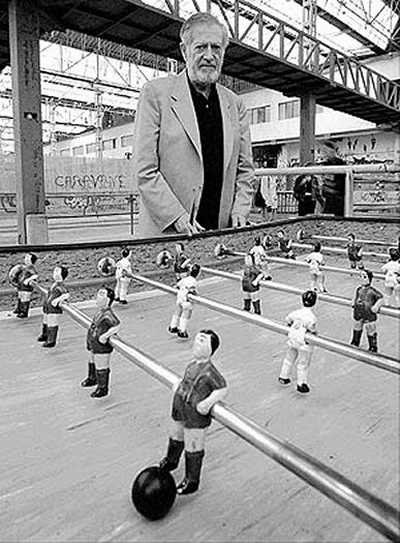Alejandro Finisterre - The inventor of Table Football
The inventor poet and publisher, died on February 9 2007
Alejandro Finisterre was a poet, a publisher, an exiled Republican, and the close friend and literary executor of the renowned poet, León Felipe. But what he is best known for is his world-famous invention of table football – futbolín.

Alejandro Finisterre with his invention - Archive photo
A gallego, he was born Alejandro Campos Ramírez in 1919, and was one of ten children of the radio-telegraphist at the lighthouse in Finisterre (Fisterra in gallego). The family moved to A Coruña when Alejandro was five years old, and he left to study in the Spanish capital at the age of 15. There, his headmaster put the teenage Alejandro to correcting the younger students’ homework in order to pay his school fees, when his father’s business as a shoe maker went bankrupt. He also worked as a labourer, in a print shop, and even as a tap dancer, as well as publishing and selling on the streets the magazine, ‘Paso a la juventud.’ It was in Madrid that he first met León Felipe.
He was buried under rubble as bombs fell on Madrid in November 1936, and was in Barcelona convalescing from his serious injuries when he had the idea for a football game which he and others with him in the hospital would be able to play despite their war wounds. His injuries had left him lame. As he said in an interview many years later, ‘I liked table tennis, and so I thought, why not invent table football?’
Shortly before Christmas that year, he asked a Basque carpenter, Francisco Javier Altuna, who was a refugee like himself, to make the table and carve the figures. Finisterre put his new invention together, and was persuaded to patent it by an anarchist leader in Cataluña. He did so at the beginning of 1937 – along with the first foot-operated page turner for sheet music, which he had invented for a pianist he fell madly in love with during his time in Cataluña. But the papers were turned to mush as he fled on foot over the Pyrenees to France in ten days of pouring rain.
It was when he was in Paris in 1948 that Alejandro Finisterre heard that a friend from the hospital in Cataluña had patented the futbolín and it was being manufactured by a company in France. He claimed his right to the patent, and emigrated to Ecuador with the money he received from the company.
He founded the poetry magazine, Ecuador 0º 0’ 0”, and met the Guatemalan Ambassador at an event which was organised to present the magazine, who asked him to produce his invention in Guatemala. Alejandro Finisterre left for Guatemala in 1952, where his futbolín was hand-made in mahogany by indigenous peoples. His business went well – he even played some games against Che Guevara during that time – until the military coup in 1954, when Finisterre was kidnapped by Franco agents and put on a plane to Panama, with the aim of taking him back to Madrid. He managed to gain his freedom by wrapping a bar of soap from the toilets in silver paper as if it were a bomb, and shouting out, ‘I am a Spanish refugee, they’ve kidnapped me, and I know how to stop this plane arriving at its destination if I have to!’ He was let off in Panama.
Finisterre was in Mexico for many years, when he began publishing again and met up with León Felipe, one of the Spanish exiles whose works he published. He returned to Spain after Franco’s death, and became the leading authority on his late friend, who had died in Mexico City in 1968. He never described himself as a poet, and said what he wrote were ‘just verses. I write them when I feel the need. Nothing more.’
Alejandro Finisterre died a month away from his 88th birthday, on 9th February 2007 at his home in Zamora, the province where his great friend, León Felipe, was also born. His ashes were scattered in the Duero River as it flows through Zamora, and in the Atlantic, off the coast of his homeland at the end of the world, Finisterre.
